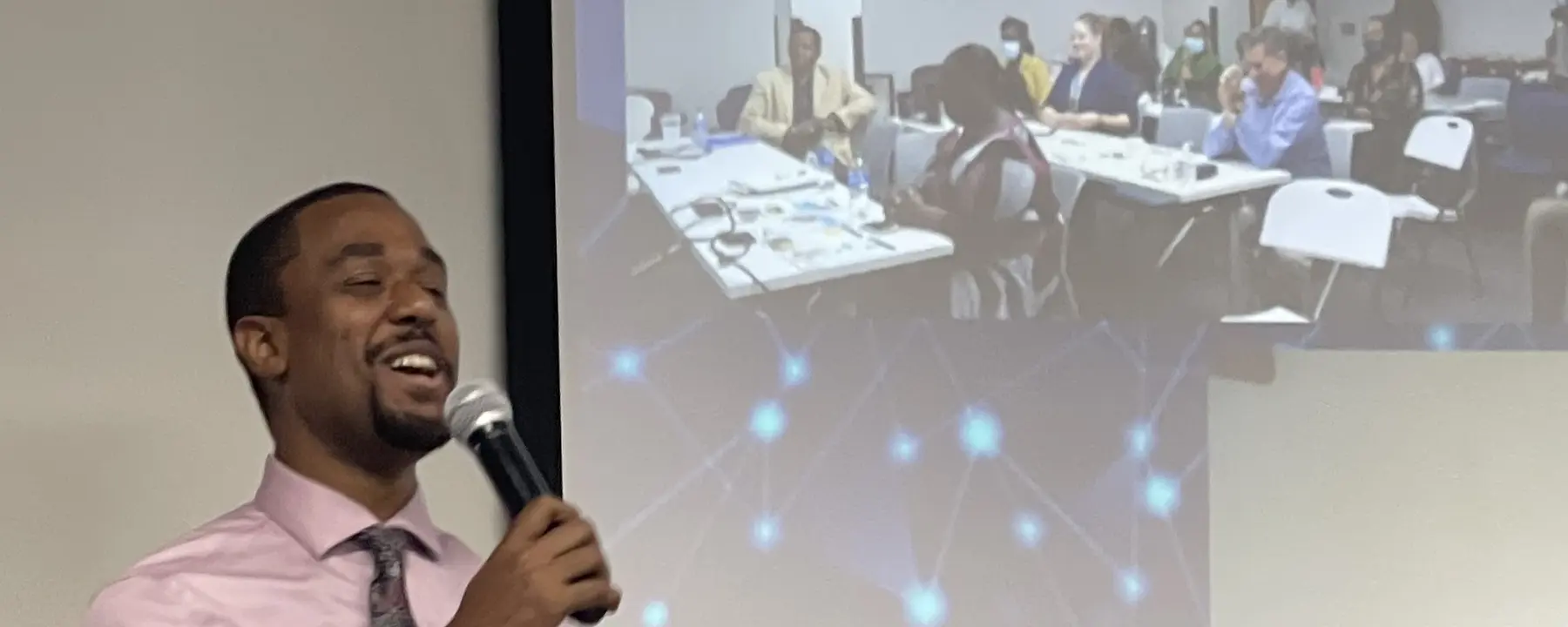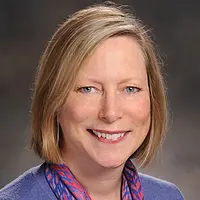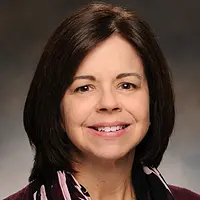Promoting Equitable Use of the All of Us Researcher Workbench by Establishing a Diverse Learning Network of Researchers from Groups Underrepresented in the Biomedical Workforce
Objective
Establish a diverse learning network of researchers and facilitate their use of All of Us data by promoting equitable access to and training for the All of Us Researcher Workbench.
Approach
Build a comprehensive knowledge-building program for researchers from groups underrepresented in the biomedical workforce that combines technical expertise with strong partnerships and a multi-level framework to support individuals, institutions, and networks working with the All of Us dataset.
Impact
Access to capacity-building, training, technical assistance, and peer-to-peer learning from the Researcher Academy will increase the diverse array of new and established researchers actively using All of Us data to advance knowledge about health, particularly for communities historically underrepresented in biomedical research.
When the National Institutes of Health launched its groundbreaking All of Us Research Program in 2018, it was a major step toward addressing inequity in biomedical research. People from diverse backgrounds have been historically underrepresented in biomedical research. This disparity has affected scientific progress. To address this gap, All of Us is working to gather health data from one million or more people who reflect the diversity of people living in the United States and its territories. The program’s goals include accelerating health discoveries, improving health outcomes, and advancing precision medicine for everyone.
Unfortunately, disparities also exist in the biomedical workforce as the result of data access, availability of grant funds, and infrastructure or other programs that would support research careers. All of Us is addressing this disparity by supporting researchers historically underrepresented in the biomedical workforce through skill building and capacity-building to analyze All of Us data.
In collaboration with the All of Us Research Program’s Division of Engagement and Outreach, RTI International created the All of Us Researcher Academy. The academy is a comprehensive program that provides training and technical assistance for researchers conducting research with the All of Us Researcher Workbench—the cloud-based analytics platform where registered researchers can access anonymized data from All of Us participants. The academy also supports peer-to-peer learning and network-building among researchers and students.
The academy is dedicated to supporting institutions with a documented historical mission or commitment to training underrepresented students. Currently, the All of Us Researcher Academy resources are free for students, faculty, and post-docs at institutions with a track record of training researchers underrepresented in the biomedical workforce. (See the Notice of NIH’s Interest in Diversity for examples of groups that have been shown to be underrepresented in the biomedical research workforce.)
Building a Scalable Framework
RTI formed a multidisciplinary team of researchers to develop the Researcher Academy. Team members brought expertise in health, education, analytics, and communication to the planning table, in addition to decades of combined experience serving as university faculty and conducting health disparities research and genomics research. RTI also collaborated with Community-Campus Partnerships for Health, whose mission is to promote health equity and social justice through partnerships between communities and academic institutions. In addition, the academy has worked with other All of Us Consortium partners to coordinate and collaborate on training the next generation of biomedical researchers using All of Us data. The result is a culturally sensitive, integrated framework designed to engage with researchers at multiple levels. Activities integral to each level include the following:
- Individual: Outreach to build awareness, in addition to education and training activities via tuition-free short courses, student internships, and mentor pairings.
- Institutional: Technical assistance and essential skill building provided by RTI Researcher Workbench coaches, in addition to Institutional Champion awards that provide critical funding enabling institutional-based research teams to access opportunities and conduct research using All of Us data.
- Network: The Faculty Scholars Program, the Connections quarterly newsletter, and the Amaze platform support capacity-building at a network level. Amaze is a cloud-based collaboration and learning platform developed by RTI that hosts course content, announcements, and a networking directory.
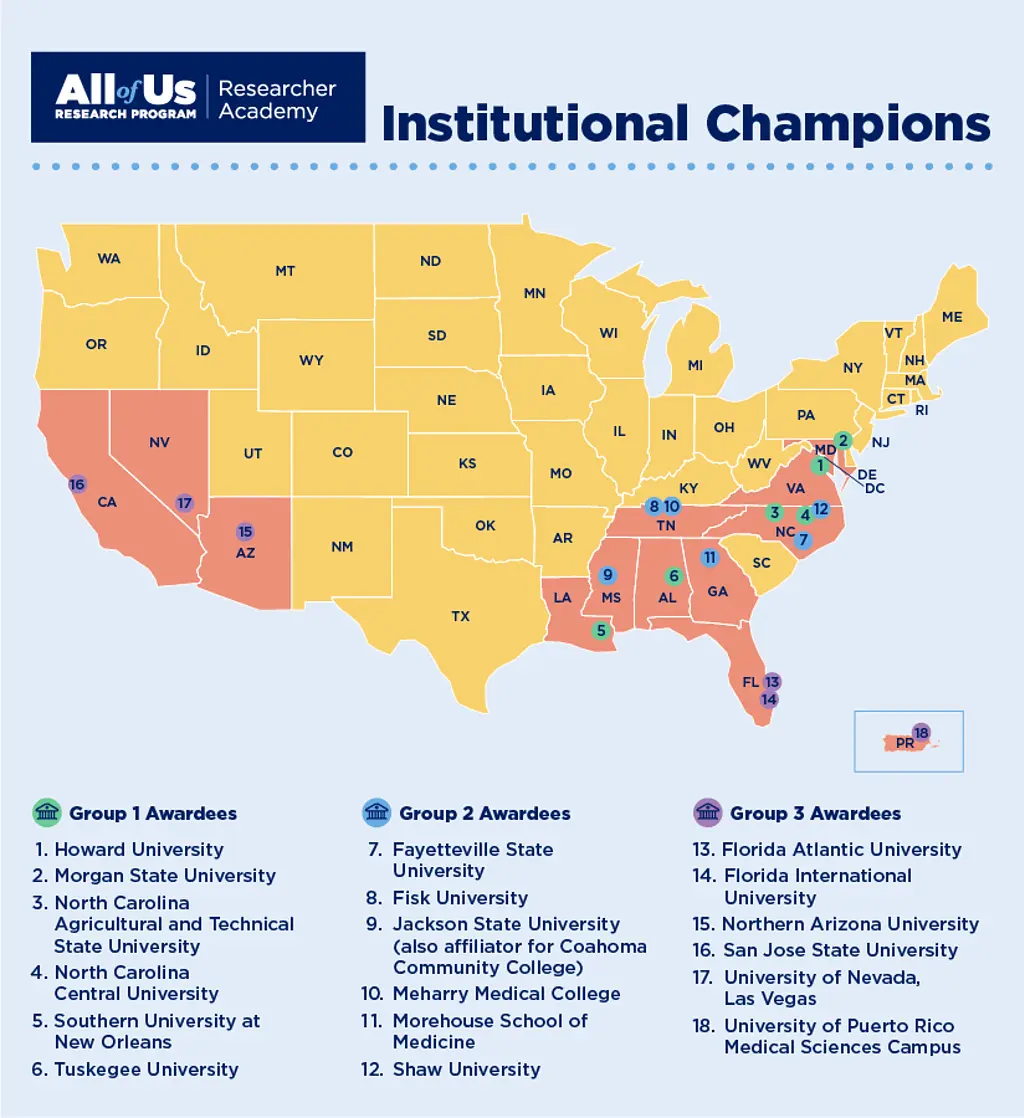
Implementation
Institutional Champion awards are a core component of the Researcher Academy. The goal is to support institutions with a documented historical mission or commitment to training underrepresented students. To date, $1.3 million has been awarded across 18 campuses to support faculty and student use of the All of Us Researcher Workbench.
The Researcher Academy offers a robust slate of training opportunities, including tuition-free short courses on topics ranging from grant writing to publication strategies. Other capacity-building courses focus on essential skills like data wrangling and statistical programming via R and Python. Currently, a team of RTI-based coaches provides one-on-one assistance and holds regular office hours to help Institutional Champion awardees navigate the Researcher Workbench platform.
In 2023, the Researcher Academy Internship Program provided six undergraduate and two graduate students with mentors, training, stipends, and opportunities to prepare posters and present their research in RTI’s 15th Annual Internship Showcase. A second group of mentors and interns will participate in the program in 2024.
Engagement
To drive engagement with its rapidly growing learning network, the Researcher Academy publishes a quarterly newsletter called Connections. This digital publication shares academy news and opportunities, course announcements, upcoming events, career guidance, and researcher spotlights with a growing base of 500+ subscribers.
In partnership with Community-Campus Partnerships for Health, the academy also hosts an ongoing series of hybrid events known as the HBCU Road Tour. Venues have included Howard University, Tuskegee University, and the Morehouse School of Medicine. The road tour provides opportunities to network and share experiences in real time, along with insights from Institutional Champion teams, the All of Us Data and Research Center, and academy co-leaders and coaches. Popular presentations include a session about Tuskegee’s history and its continuing legacy of research and a talk by Dr. Karriem Watson, Chief Engagement Officer for the All of Us Research Program.
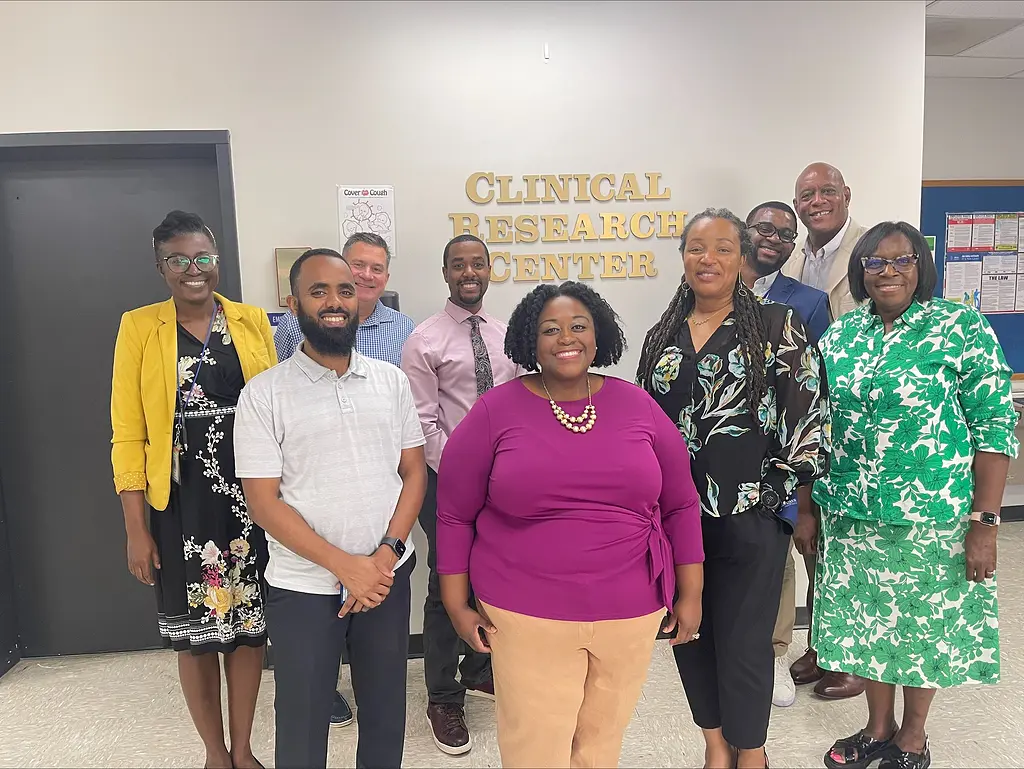
HBCU Road Tour event, Morehouse University. (L to R)
Dr. Elizabeth Ojemakinde (Morehouse), Dr. Muhammed Y. Idris (Morehouse), Dr. Alan Wells (CCPH), Dr. Javan Carter (RTI International), Dr. Sula Hood (RTI International), Dr. Priscilla Pemu (Morehouse), Kelechi Carl Igwe (Morehouse), Al Richmond (CCPH), and Virginia Hunter (CCPH).
Finally, the academy oversees the Faculty Scholars Program, which helps awardee faculty expand their peer networks and encourages collaboration and information sharing between researchers and across institutions. The program, which includes quarterly Faculty Scholar Convenings, Senior Scholar appointments, and a Scholars Forum, continues to expand beyond its inaugural 47 members.
Impact
The Researcher Academy surpasses traditional models by not only providing grant funding and materials, but also by serving as a learning network that actively supports peer connections, mentorship, and technical assistance for researchers at minority serving institutions.
Since its inception, the Researcher Academy has administered more than $1.3 million in funding to 18 institutions with a documented historical mission or commitment to educating underrepresented students. To date, the academy has offered 15 courses serving an estimated 197 learners. Research projects made possible through Researcher Academy Institutional Champion awards, training, and technical assistance are analyzing patterns in cancer, diabetes, hypertension, and other critical conditions that disproportionately affect communities underrepresented in biomedical research across the United States. These discoveries will help drive innovations in health care and inform policies to eliminate disparities.
The All of Us Researcher Academy is supported by the Division of Engagement and Outreach, All of Us Research Program, National Institutes of Health, Award Number 1OT20D028395-01.
- National Institutes of Health (NIH)
- Community-Campus Partnerships for Health
